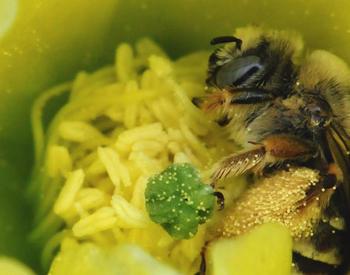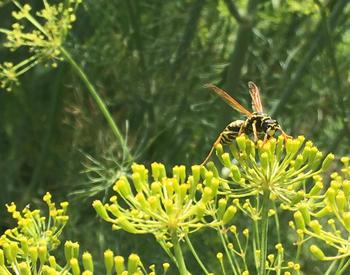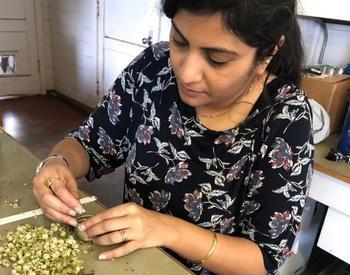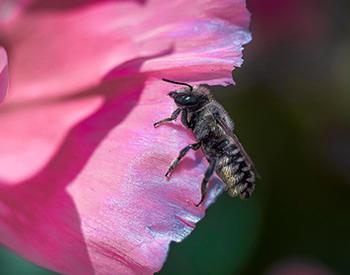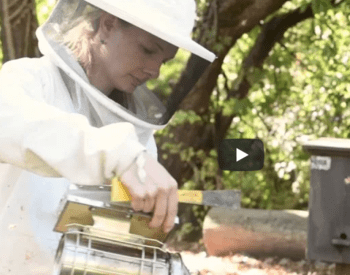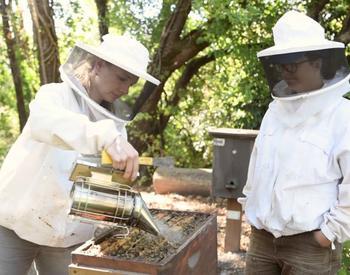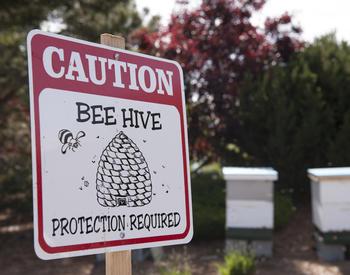Transcript
Speaker 1: From the Oregon State University Extension Service, this is Pollination, a podcast that tells the stories of researchers, land managers, and concerned citizens making bold strides to improve the health of pollinators. I'm your host, Dr. Adoni Melopoulos, assistant professor in pollinator health in the department of horticulture.
Speaker 2: Last week, we had an episode devoted to a very influential 18th-century book called The Fable of the Bees by Bernard Mandeville, and we had a very capable guide leading us through that book, Dr. Spencer Leonard, a historian who primarily focuses on South Asian studies.
Although I know Dr. Leonard personally from a collective project that we both belong to called the Platypus Affiliated Society kind of thinks about the problem of freedom in modern society through history. Now, this week, we're going to expand on that conversation. In the first week, we sort of set out the context of why Bernard Mandeville has created this very peculiar beehive and what he's trying to get across.
This week, we're going to get into that a little bit more. What Bernard Mandeville saw is the stakes of doing this kind of writing this book and depicting the bees in this way and their influence through history. And at the end of the episode, we've got this great, as you know, in all shows we have this. Our guest told us book recommendations, but favorite tool and favorite pollinator, and Dr. Leonard turned the tables on me at the very end and asked me for my very favorite pollinator. And so lots of secrets to be divulged in this week's second part of the podcast devoted to Bernard Mandeville's Fable of the Bees with Spencer Leonard.
Thanks a lot for joining us again this week, Dr. Leonard. And I want to pick up on a theme that was developed in the first episode that we did, namely, you know, this grumbling hive that Bernard Mandeville describes in his poem in some ways is its actual grumbling is pointing towards recognizing what it is that there's something about the form of society that comes into being in Bernard Mandeville's lifetime that he's trying to express through these bees. The one metaphor that I really loved was this idea of this new form of wealth that the society generates, which he kind of analogizes to honey, the honey that's produced the wealth of society as being something quite different from how wealth may be generated in a previous form of society. And that people need to be clear about it.
Like, it can't just take any wild direction. There's a way in which people per society to advance the grumbling really needs to settle on these questions. So I want to ask you about that. It seems to me the other theme that came out is that people may not be fully aware of their participation in the various activities that constitute this new form of society of what it is clearly because they're, you know, they're pieces in the society. So how does he think about this grumbling?
Like what what should be the stakes of this grumbling and why he thinks that people need to sort of snap out of this idea of like society is just virtuous people doing virtuous things. Why does that lead to maybe less clarity of what it is?
Speaker 3: Right. So just to kind of underline the point, this issue of like on the one hand, yeah, I guess you could put it in kind of classical Marxist terms, but really their terms that go back into into the enlightenment. On the one hand, the bees are free, right? And as it were individual bees, right? We are free in society. We pursue our purposes. We develop our capacities in and through the sale of our labor, our work, and the way that we engage in society.
And together that creates sociality. Which is expansive, right? That's changing, that's growing in one of the ways in which it's growing. An aspect of that is wealth. Right. We think of wealth as quantitative, but it's not merely quantitative.
Right. It's actually giving greater scope to the way that we live in society, the new ways of living. So that idea of individual flourishing contributes to society's flourishing, which has, as it were, an economic dimension. This is what Mandeville is getting at. Right. That the individual and society are mutually reinforcing. And this is the bourgeois dream.
Right. This is the enlightenment dream of a society. In other words, the more complex society is, the more complex an organism, as a sociality it is, and the more the individual flourishes in his individuality.
Right. Whereas we often think that the more powerful society gets, the more it crushes us as individuals, the more it demands obedience, the more it's stamping out any misinformation that we might be subject to, or we might want to assert in society, the more it's forcing us to conform, etc. That's not the way Mandeville's thinking about it. Mandeville's thinking about the hive and the bee is sort of mutually constitutive. And that's the vision that he has for the society to stay. Now, this issue of, so it's around that that we have to think, right? It's what it's around this question of the relationship of ourselves to society that the bees are grumbling. Right. They're talking to themselves about the way that they live, just as we do.
Right. Every day in every newspaper, in every magazine, in every television show, in every, not just in the news, but also in law and order and everything else, right? We're reflecting society to ourselves. Right. So he's catching on to that, which is also very modern, right? A modern society is a self-conscious society, a self-reflective society. Right. And to me, this is the most interesting part of the book.
But of course, it's also a tricky part because Mandeville's wicked. His books were condemned. It's even burned at the stake when it's translated into French.
And as many people, it was tried. It was condemned in England, but it wasn't actually burned in England. You know, the by the hangman, but it wasn't French. And, you know, of course, as everybody pointed out, his name was Mandeville. Oh, dear.
Right. So the wicked part of the poem is that it shows how in response to a widespread demand for a moral society, as he puts it in the poem, everyone cries, damn the cheats. The bees abandon their commerciality. They abandon their way of life. And as he ironically puts it, honestly, honesty fills all their hearts.
But with what results? The bees lose their prosperity. Immediately, the prostitutes, the lawyers, the drug dealers, the money lenders, the sailors, and the shipbuilders, the bartenders, the locksmiths, or he has locksmith bees and sailor bees and money lender bees, etc. The dealers and luxuries of all sorts, the cops, the quack physicians, the stockbrokers, the lying politicians, the priests, they all lose their jobs.
The beehive economy, because of course, all of these people, you know, and this is that you can see how subversive it is as he's basically comparing drug dealers, bartenders, and prostitutes to priests and politicians. Aha. Right. Because he's saying, well, they all serve our vices.
Right. If you want to, right, if you want to hate other people, right, if you want to, like, get really mad about, you know, how stupid people are, get hysterical about Donald Trump and all of his idiotic followers, right? You can call them deplorables. You can say that they're clinging to their guns and their religion. The politicians play to your vices.
Right. The priests play to your vices. They're there, of course, in Mandeville's making, you know, perhaps an anti-Catholic point, right, because Protestantism is sort of uncomfortable with the very idea of a priest. The priests are there to let you sin. You can go and have sex with the prostitute and you can go to the bar and get drunk. And then on Sunday morning, or, you know, whenever you can go and the priest will absolve you of your sin, you know, you give him a couple of bucks, you know, drop a few bucks in the offering plate or whatever, and, you know, you'll be fine in case you die that day. You'll go to heaven. Right.
So in all of these ways, Mandeville is saying, look, our society's based on vice. You'd better not get rid of it. Right. Don't say, damn, the cheats.
Because cheating each other is the basis of society. Right. You know, you go, if you're going to go and buy a car, you know, you're not worried about whether or not the car dealer can stay in business if he sells you a car at an extremely low price. You are concerned to get it at the lowest price possible. And of course, he's concerned about making you pay as much as possible. He isn't concerned about, you know, well, you know, isn't my profit margin a bit high? No, he's out to cheat you. So we can't say, damn, the cheats. This is Mandeville's point.
Speaker 2: So I suppose, the idea is that you know, these, you know, the idea of society being sort of led by the virtuous is getting in the way of recognizing what society is, that there's, it is actually a liability in being able to comprehend things. Why is taking these strident positions?
Speaker 3: Right. And of course, his point is that what you're calling vice isn't vice. Actually, he's using that rhetorically. If you view this society from a medieval perspective, it looks wicked. It looks like it's based on vices. But actually what's happening is people are behaving in accordance with the law of a new form of life. Right. What's important is not the morality of the behavior, but the lawfulness of the behavior.
Right. So what happens to the bees that one immoral society who don't understand, in other words, who are operating with an old morality, their economy collapses, and the few that survived the kind of apocalypse that results end up flying into a hollow tree in living. That is to say, from the point of view of his audience, what his audience would understand.
Great Britain, which had been a continuous war with all of the forces of continental absolutism at the head of which stood Louis XIV's friends, would give up its struggle and in that sense would betray the promise of a newly emergent bourgeois society. So the science of society, though Mandeville coily maintains that it will only do good if the aim is that it will do no good if the aim is that people are to be made better, is actually necessary. The science of society is necessary because it's necessary to clarify the basis of our modern freedom. People who are trying to succeed should not attack others who are trying to do the same thing. That's an immediate goal to put an end to the notion that society rests on Christian virtue and that the most virtuous, presumably the saints and the knights, namely the Catholic Church and the aristocracy, should rule over it.
No. But on a more fundamental level, Mandeville is telling us a story of the self-domestication of mankind in history. I was saying at the beginning, that society passes through epochs in the history of sociability and thus in the history of morality and it's necessary, at least now has become necessary in the early 18th century to achieve a greater self-awareness of this fact, of the fact that we domesticate ourselves and that we have domesticated ourselves to a new type of society, one that thoroughly undermines the old aristocratic prejudices against workmen, against merchants, as well as the old prejudices, the old kind of religious prejudice. So there was the aristocracy's prejudice against merchants and labor, people who get their hands dirty, but there's also the priestly prejudice against luxury and ease, which was in part the priest's prejudice against the aristocracy.
Right? What Mandeville is saying is that if this society is going to come into its own, it has to understand that while it might be necessary to conduct war, to preserve itself, to expand itself, to protect itself, ultimately what the old morality thinks of is pride or self-liking or self-esteem, he calls it self-liking, it's a precursor to Jean-Jacques Rousseau's notion of amour propre, of a love that is appropriate to ourselves and directed at ourselves, that this has been transmuted as a basis of society into something that goes beyond violence and aggression into peaceful competition. So commercial society allows everyone, including people who are not well-born, including people who have no pedigree, to compete for public esteem and abrobation in peaceable participation in civil society.
Speaker 2: And I was thinking, you brought up earlier the Shakespeare quote where the idea is that you can't discern the difference between pillaging and commerce here. Even people will be able to generate the honey of society, this expansion by just their mutual participation in society.
Speaker 3: Right, by getting and spending, by participation in the cash nexus, by participating in the marketplace, by arguing with each other, by buying newspapers that disagree with one another, trying to outdo one another, trying to have that BMW instead of just the Chevy that your neighbor has. All of those things, right, Mandibou saying like, yes, those things are all good, right? Those things are better than jousting. They're better than ritualized war. They're better than holding peasants in subjection, right? Rather than proving ourselves through violence and self-subjugation, we channel our love of ourselves, our selfishness, into something good for society, right? That's the famous subtitle of the poem, How Private Vices Are Public Benefits. Right, you can, this has its echoes in Adam Smith's notion of the invisible hand, in Emmanuel Kant's notion of unsocial sociability, right, that it's out of our attempt to compete with one another that we're most social. Right, that sort of thing.
Speaker 2: Yeah, I love the way that you expressed it in the, you were mentioning Emmanuel Kant, unsocial sociability, it seems like a paradox, but yet.
Speaker 3: Right, so these are all mandavillion thoughts, right? And he's one of those figures who's perhaps even more wicked than someone like David Hume. You know, a lot of times with Mandaville, people won't say his name. You know, later people who are influenced and really, you know, a lot of times in the 18th century, they don't say who they're being influenced by at all anyway. Okay, they just take it for granted that we all know where these, that these ideas are in the air, and here's my take on them. But people do mention influences from time to time, and certainly, Emmanuel Kant did. Russo does, Smith does, you know, they, it's rare that you see the, the, the hat tipped explicitly to Mandaville, even though when you do, people will say just how influential he was.
You know, Adam Smith, Russo actually stood to point it out. It's one big gigantic thought, right, which is actually a thought that you know, just as nature, you know, for your scientific audience, you know, nature is actually emerging for the first time as an idea, right, that like, okay, these animals and this world out there in nature, it's not governed by God or by sprites or by fairies or by any kind of, you know, pagan forces or, or Christian forces. It's governed by laws, right, that are just, which is just to say that there's, there's orderliness that we observe, right and that all of the animals in all of nature are, they're, they have their purpose.
They're not there for us exactly. And at the same time, we can discover all sorts of uses for them. In the same way, society is emerging. And I think society is the, is, is actually a critical concept to understand nature, right, to understand that what we are is nature, thinking about nature, right, we are nature's developed consciousness. That consciousness is there and the other animals, other animals, you know, presumably think about their environment, they're reacting to it, they're contemplating, you know, should I do this, should I do that?
In some sense, they're experiencing fear, they're experiencing joy, they're experiencing excitement, they're experiencing suspense, you know, whatever, right, the cats watching that mouse, right, in rapt attention. In the same way, we are looking at the world. And one of the things we have to understand, and when we look at it, is there's a world that we make for ourselves.
And then, you know, here's what goes on at the top of that Himalayan mountain, which really couldn't care less about us, or what goes off in those distant galleries, galaxies, or what goes off amongst these deer when we're not watching them, right, all of those things, right, that's, there's nature that is, as it were, outside of us, even though we are it, right, that's the significance of mandible thinking about animals that have created a conventional sociality that they keep changing, right, so that we can say, well, there was ancient society and there was medieval society, and there's bourgeois society, and there's a modern capital and capitalist and industrial society, that concept of like, nature in humanity, that at the same time is subject to, you know, we never cease to be animals, but we're also molding our instincts and molding our passions, channeling them in society. That's what manable contributes.
Speaker 2: That is fascinating. I never quite thought of it that way, but there, you know, there's, you know, in the, in the becoming conscious of society, and its emergence, that that sort of gives people the capacities to reflect on, you know, nature as a whole. But I, I don't want, I want to punctuate that thought, but I also want to transition. I have a final question for you I wanted to sort of just put a bow on the legacy, this gigantic thought that sort of, you know, is expressed by mandible.
But as you point out, is sort of, mandible is also not just thinking these things. He's, he's expressing, you know, the, you know, he has the concern of the 1688 English Glorious Revolution and wants to make sure that it advances. And I wanted to end with this idea of the, what you mentioned earlier, that there's a way in which the fable of bees, perhaps unnamed, still resonates into the 18th century. I recall you had recommended a book to me at one time, and I really enjoyed it, the McPherson book on the Civil War, Battlecry Freedom. And in that book, there was, there was a, it recalls a debate that happened in the lead up to the American Revolution between Thomas Hutchinson and James Otis on the problem of the colonies. In this debate, Hutchinson argues that the problem with the colonies, the people of Boston, is that the common people live too well. And Otis, on the other hand, responds that American people cannot be too prosperous. They cannot import too many goods.
And that a tariff on luxury goods would undermine the fabric of American society. And McPherson at that point says this echoes Mandeville. It's just, you know, quite remarkable. And I guess I want to ask, you know, why did Mandeville seem so relevant to revolutionaries of the 18th century? And, you know, does it still resonate today? Or in what ways does it, does this thought resonate today? That's a great question.
Speaker 3: So just to remind your listeners, right, Thomas Hutchinson is an agent of the British Crown. He's a governor of Massachusetts, which is a royal appointment. So when he's debating with James Otis, who is a lawyer, basically, in Boston, in the 1760s, Otis is really important in the earliest stage of the American Revolution, which is to say, in the early 1760s, up to and especially in the Stamp Act debates in 1765. So Mandeville is a creature of an earlier time, right? His concern could be viewed as partially conservative in that he's anxious for the consolidation of the glorious revolution in the face of an international threat of absolutism, in other words, which I've talked about a lot, but there was also an internal threat.
Right. Some people were loyal to the old royal house, to the house of Stuart, to the house of James II. And those who want to restore that house are most prominent in Scotland but are also to be found throughout England and Wales are known as Jacobites. That's what the term Jacobite means. It means the restorationists in 18th century Britain, and they had a number of uprisings in the 1710s, I believe, in 1713 and 1719.
And the last great attempt was in 1745. So he's concerned that we don't let our discontent with all of the corruption that is made visible in the new regime. For instance, there was a famous commercial sort of racket scheme called the South Sea Bubble, in which the state was involved. There was all sorts of corruption of ministers and so forth.
He's saying, look, you can't let that, just because there's corruption, just because this world isn't perfect. We can't go back. We have to defend the order that we have. We have to defend, we have bigger fish to fry. We have to worry about the Jacobites. We have to worry about the French absolutists.
We're fighting wars on a number of continents. By all means, let's stamp corruption. But at the same time, let's understand that we need to give scope to this society.
We need to have laws, like the laws that guarantee our liberties and our property, etc., that generate a lot of wealth, that then there can be some corruption in the redistribution of it that won't make a fundamental difference. That's sort of the spirit of defending the glorious revolution in the 1720s. That's why people are reading his book in such large numbers and why he's read as a wig. People who were alive, American revolutionaries who were alive at that time, say, Benjamin Franklin, would have agreed.
Right. They would have been like, yes, it's great to be English. We have to defend the ministry no matter how corrupt Prime Minister Walpole is, no matter how corrupt these ministers are. We have to defend this order because otherwise, they're going to get rid of parliament altogether. We're going to have an absolutist monarch. We're going to be made slaves in a bourgeois sense. We're no longer going to be subject to the law that we give ourselves, etc.
So that's his world. The American revolutionaries are descendants, as the example of Benjamin Franklin implies, of those earlier ways. They, of course, defend the legacy of 1688.
Right. This revolution of 1688 was the first American revolution. It makes a big difference in the way things are done over here, and everybody knows it. And everybody's inspired by the thinkers of 1688. So, the great thinker of the revolution was mainly John Locke. John Locke, you didn't sit down to discuss with John Adams Thomas Jefferson, or Benjamin Franklin. The left of the revolution, the right of the revolution, the proto-federalists, the proto-Republicans, the proto-Jefersonians, the proto-Hamiltonians, none of them. You're not in debate unless you have John Locke's chapter and verse.
This is the grammar of politics. Okay. Right. And so, we're all whigs, including the British ministry that we're opposing, right?
So what's happening, in short, is that it's not, by the time you get to the American Revolution, just saying your wig isn't enough. Right. You have to clarify it.
And so, there's a lot of ways in which people talk about it. A very common way of talking about it in the United States or the 13 colonies is that people called themselves patriot wigs. Right. A lot of times people think American revolutionaries, when they call themselves patriots, are saying that because they really love the nature of America. They love the trees. They're like their patriots. They love their country or some crap like that. It's not some blood and soil proto-nationalism. Patriotism means I'm a follower of the wig-ism of William Pitt.
That's what it means. William Pitt was a prominent politician in Britain who was viewed as a radical. He called himself a constitutional wig. He called himself an original wig. He called himself a patriot wig. And the patriots in America are followers of that. This was a person who actually supported the American Revolution from within the parliament.
Speaker 2: All right. So if I get just to sum that all up. So everybody in the American Revolution would have considered themselves, you know, well, even Hutchinson would have understood themselves as a kind of the legacy of, you know, 1688 and mandible. But clearly, there's a divide opening up that I don't quite understand. Right. So here's what we're mandible citizens. The spirit of the mandible is, look, we made a revolution.
Speaker 3: But what did we accomplish? This is why I began by talking about the Reformation, the Enlightenment, etc. Did we just keep a Protestant, a Catholic from being the king? Is that the significance? What is the significance? What are we trying to do?
Right. What is the project that we're really trying to advance here? Is it a theological project? Are we trying to create a godly society? Are we trying to create a Christian society?
What are we trying to do? Right. And so you might call this a scientific quick. Let's get clear. Let's reflect upon the revolution and understand what is at the core. This is what's at the core of the American Revolution. Right. The American Revolution is saying in order, you know, and why do you have to do that?
Right. Why do you have to be clear? Because actually, you can't preserve what we can't preserve the freedom that we have without advancing it. Right. We can't hold on to the legacy of the revolution unless we advance it. This is a very modern talk. Right. This is how defenses of you know, of what people, what, you know, since a layman might call capitalism, what I've called commercial society here.
Mandeville is inspiring someone like Adam Smith and beyond him, someone like Karl Marx, because they're all people who are saying when you change society, you bring it to a crisis such that it has to change again. I see. So that's the need for reflection. Right. We have to reflect on what we've done because actually what we've done goes beyond what we originally imagined.
Speaker 2: So someone like Hutchinson may kind of go back on this tradition because he's fearful of the change. And it's like, you know, it's like in his statements.
Speaker 3: He's trying to stabilize it. He's trying to stabilize it. By 1776, the British Revolution was in crisis. The American crisis is an expression of a wider British imperial crisis, the British Empire itself being built on revolution, where British elites are trying to resolve that crisis by turning the empire into something more exploitative than it had been before. Hutchinson is a tool of that project. He's a tool of this crypto Tory repressive project that is being expressed in India and the Americas. The Indians don't really resist it for reasons that I can talk about to great lengths, but they don't. The East India Company built an empire in India that helped to prop up a British oligarchy. The Americans resisted. They see what's happening in India and they say, screw the East India Company, we're dumping their tea in the harbor, right?
Because that's emblematic of an empire-wide repressive project. They see Hitchens as a tool, therefore, of an ossified British elite. They brand him as what he describes. He says I'm a wig.
They say, no, you're not. You're a Tory. You're a traitor to the British Revolution.
And to them, Hutchinson is the face of a crypto Tory or rotten wig, degenerate wig oligarchy in London. The Stamp Act that Hutchinson's trying to impose would have, attacked the core of the revolution. It seems so minor, but it's not just that it's taxing commercial transactions, right? It requires that contracts, any printed contract, any, not necessarily printed, any handwritten contract, any IOU, any, anything in that, you know, anything that we might call a check, any bill, you know, look, I agree to pay you, you know, in 10 months, the following sum, all of it had to have a stamp that was, that of course was a tax. So you're taxing commercial transactions themselves, you're taxing our sociality, right? You're taxing the actual social relations in as much as those are formally contractual. And you're also taxing newspapers and magazines.
These had to have a stamp affixed as well. So here you're not just talking about taxation without representation, what most Americans think the issue was, right? That the British parliament is imposing a tax directly on the American colonists and that that tax isn't being, as it were, collected by our own, you know, something imposed by our local representatives. It's being imposed by people we didn't vote for.
It's not just that. As a radical wig, Otis is pointing out that the Stamp Act is attacking the economic vitality of society and it's rendering society less capable of grumbling in Mandeville's terms. By taxing newspapers and magazines, it's making society less capable of reflecting on itself because of course taxing the press is making newspapers and magazines more expensive. It means that common people can't read them because they can't afford them and therefore they're not catering to a broader market.
They're catering to a more elite market, the newspapers and magazines themselves. And so the American Revolution, just to extrapolate from that point, isn't just about rights in some abstract way. It's like it's about, you know, my right to think what I want or my right to say what I want. What is the point of those rights? What is the point of the institutional order that's built by the American Revolution of the Constitution of the Republic?
The point is to give scope to the development of society, to give scope to our ability to change. This is what people don't understand when they, for instance, attack misinformation. When they try to limit free speech, when they try to limit our grumbling because there never was an idea, a new idea that was born with the majority consent.
Every new idea emerges as misinformation if you will. Right? We have free speech in order to we can change the way that we live, ultimately, from a revolutionary perspective, from an 18th-century enlightenment perspective. We have these rights. We can assemble. We can publish. We can associate with whom we please in order that society can become something that we can't foresee.
Right? The American Revolution was the 18th century. This is the real difference between us and them, and this is their critique of us. We are now afraid of change, but we can only imagine it as technological.
Right? They imagined that humanity would change morally, that it would change in its attitudes, that it would change in its mores, in its habits, in its practices, in a way as to render them entirely obsolete. Their whole purpose was to open the door to a future that would make them absolutely antiquated. Right? Whereas we too often think, well, the world shouldn't really change.
Right? Or we just need some technocrats to modulate, you know, how things are taxed and where we distribute the money and what government programs. But the idea that society could completely change, that we could open into a new form of life, that we will seem as strange to the future as the past seems strange to us, is a thought that I think is perhaps less common now.
Right? Whereas the revolutionary thinkers are heirs to the mandible, they're not just talking about asserting ancient virtues. They're not just saying, well, we need to get rid of the kings and aristocrats. They're saying, we need to give scope to human advancement in history.
Right? So that when he says that, and I guess this is the last thing I'll say, and that there's a mandivillion in an American, an 18th-century revolutionary critique of the 18th-century ideas themselves, right? That there's a sense in which their thought invites us to go beyond the ways that they imagine freedom to be realizable. To put that more concretely, mandible thinks we need ambition and avarice, envy, and fear to, in a sense, motivate our society.
Right? What makes us work, what makes us submit to society is the need to work. That's how we participate in it. He thinks that maybe, he can't imagine it being otherwise. But we live in a time where that old bourgeois form of flux is coming into fundamental crisis in a way that mandible could certainly recognize in as much as it suffers from endemic unemployment.
Right? That is the very idea that the more we work, the more we participate in society, and the more that's available to fewer and fewer people, actually. And the more it makes us actually discardable, fungible. Right? It's in that way that our freedom is generating its problems. Right? And I would argue that in this sense, the old project of being a busy bee, of being a productive member of society, of everyone being in the hives, right? That is increasingly less available to us. Or we might say that the idea that participating in the hive is mutually beneficial to the bee and to the hive.
Right? That society and the individual are mutually reinforcing. That may not be true in the same way. And mandible would ask us to reflect upon our society and to see how our very freedom is pointing beyond the way that we live. Right? This is how I would, I would suggest that even the defense of capitalism that we see in someone like Mandible or Adam Smith actually is motivated by a project of freedom that isn't wed to any specific institutional order.
Right? But imagines at the most fundamental level that the way that people will exercise their freedom in the future goes beyond what we can imagine. And yet we must advance that.
Speaker 2: That is fantastic. That is very, it's interesting to think about how these thoughts, you know, the kernel of the thought, you know, although the world has changed and the specific concerns have changed, may still resonate in the present differently. Let's take a quick break. I want to come back. We do a segment at the end of the show. I'm very curious about what your answers are going to be when we ask our guests three questions.
I've never had a historian on the show, so I'm very interested in your answers. Okay, we are back. So I've got three questions for you. The first one is, do you have a book recommendation for our listeners?
Speaker 3: Well, you mentioned one that I'm just going to repeat. I am a, I said briefly, you know, I could say a lot about the conquest of India by the British in the 18th century. That's because professionally, I'm a South Asian historian.
That's my field. And even when I've gone for job interviews to be a South Asian historian, to be hired as a South Asian historian, and someone asks me, you know, what's your favorite history book? I'll still say, Change Me Here Since Battle Cry of Freedom. I've said that for so long, I don't know if I still believe it. I've read a lot of great history books, you know, but it's a masterpiece.
There's no doubt about that. And it gets at the crisis of the American Revolution, I think, and very much in the spirit of the way that we've been talking today. The way in which, you know, for instance, it gives much more seriously than we are accustomed to now in our rather lobotomized context, you know, our very limited public discussions today deals very seriously with, for instance, this slavery question, right, with the relationship of the American Revolution to slavery. Why, of course, the American Revolution was supposed to be slavery, that of course, they expected this institution to die out.
They set it on the train of ultimate extinction, to use Abraham Lincoln's phrase, and yet it comes back, and it comes back in a dynamic, expansive, and threatening way under the impulse of the Industrial Revolution and the production of cotton. I would also, you know, if I can sneak in a second one, I would say that my friend James Vaughn's book on the politics of empire at the accession of doors, the third, is, I think, really one of the most important books on the American Revolution, but really the American Revolution in world history, in British imperial history, but ultimately in world history, to come out in a very, very long time. And I think it would help to understand a lot of the stakes in terms of what I was saying with respect to the legacy of 1688. So those would be my two historians' book recommendations. James McKeirson's Battle, Cry of Freedom and James Vaughn's Politics of Empire and the Accession of George III.
Speaker 2: And we'll have both of those linked in the show notes, and what I think they're, you know, kind of remarkable is in some ways they kind of book in the American Revolution in a really great way, and James Vaughn's book is really taking up this, you know, mandible forward kind of world. Right. Fantastic.
Okay, excellent. The next question I have for you as a historian is if you have a go-to tool, you know, sort of indispensable tool that you rely on, or use a lot.
Speaker 3: Well, the thing that I've been using a lot recently is, you know, in some ways it's old, but now it seems to be everywhere, which is voice recognition software. It's everywhere.
It's in, I use it a lot in Google Docs. You realize how, and I think I see it actually in my devices, in my Facebook feed. I think my phone understands what I'm saying better than it used to.
I think that the surveillance state, which is obviously, you know, not really like people listening, you know, so much as computers listening has gotten a lot better. But, you know, to turn the tools of the master against him, you know, in other words, voice recognition wasn't really built for me. It was built to impress me. But I nevertheless use it a lot in my writing. I use it in taking notes. I find it's really advanced very far beyond what it was when I tried and failed to use it as a graduate student.
Speaker 2: No, it's really gotten to the point I had, the last phone I had, it could transcribe on the fly. I would get, you know, just the computing power, because I remember the old transcribing programs, they just couldn't do it.
And you were always going back and backspacing, to some extent, you still have to do that, but they are getting remarkable. I love the idea, I imagine, as a historian, you'll be reading something and a thought will come to you. You want to express it quickly so that you don't lose the thought, and this must just speed the process up.
Speaker 3: It does, you know, and I find I like to write drafts of what I'm writing, you know, just by saying it out loud.
Speaker 2: Well, fantastic, despite its, perhaps, nefarious origins. Indeed. All right, our last, my last question for you, and this, you know, as a historian, I'm not sure if this comes across your purview, but we ask all our guests, if they have a favorite pollinator species, and I'm curious if you might have one.
Speaker 3: I think my wife probably has one. I think she might even know what a pollinator is. I think she might know. I think it's a plant, but I don't know if it's a plant or the thing that pollinates the plant. I just don't know what a pollinator is, Adoni. I'm hopelessly ignorant, but...
Speaker 2: I think this is in the spirit of mandevils, like, you know, a Dutch frankness.
Speaker 3: Yeah, I know about these things. I know my wife likes flowering plants, and I know that if I buy them for her, she stays happy for a day or so with me, you know, and that's, of course, highly to be desired. That's all that I know. What is your favorite pollinator species?
Speaker 2: You know, it's funny. Nobody's asked me that question, but it is clearly the honey and it is for the reasons of, you know, the reason this is in this episode. I loved honeybees because there was a whole kind of truck and trade around them. You could go to any city and people would be keeping bees. You could go to, you know, a small little coffee shop in North Dakota, and there would be somebody whose business was... And I loved that honeybees, unlike any of the pollinators, really had this big network of people. And that's, you know, primarily my love of honeybees is the people behind the honeybees.
Speaker 3: I never knew whether I was supposed to be afraid of the bees or not. I still don't. I feel like I'm practicing some kind of zen, like, mind over body or something, you know, when there's a bee and I'm like, okay, I'm not gonna move.
I'm not gonna be fussed by this thing. Yeah. But I don't know if that's rational or not.
It is some kind of... There is some irrationality in my response to bees. And I don't think I've ever approached a bee hive. I've never done any kind of beekeeping.
Speaker 2: Well, the next time you and I are together...
Speaker 3: Do the bees sting because of... It's because they're confused. Do they do it... In other words, do they sting us on purpose or are they sorry?
Speaker 2: This is a question that's never been posed to me.
Speaker 3: Uh-huh. Clearly, you don't talk to many children because my questions are as sophisticated as a child.
Speaker 2: I do do a lot of education with children. And the one thing I point out, is we have... There are about 2,000 species of bees in the United States. And many of them are not social. They don't have a society. They are just like a bird.
They make a nest and they provision it. The vast majority of them are like that. They're not very defensive. And the analogy I say... Or the point I say, if you took one of them and put them in your nostril and squeezed it, they may sting you. But apart from that, most people don't even recognize them. It requires a high level of specialization to recognize this little thing the size of a 12-point comma is a bee. Yeah. Right. So, yeah.
Speaker 3: Do beehives, bees, have they... Has human cultivation made them more sociable?
Speaker 2: No. It's remarkable...
Speaker 3: Does that occur in nature? And we just sort of make benefit of that? It's a strange thing because it's a small industry, the beekeeping. And so, bee... And also, the breeding of
Speaker 2: bees are very difficult because they mate in the air. You know, they're very undomesticated. They actually leave the hive in the same way as mandevils, you know, when the society collapses. It does happen and the bees just kind of disperse. But there's... They leave domestication all the time and go live in the woods. It's a funny little system.
Speaker 3: See, that's... We can't do that, Adonis. If our society collapses, it isn't going to be just like a peaceful return to the woods. Yeah. It isn't going to be just like Ginga's con comes and lays waste and we just sort of rebuild and the cycle resumes. It's going to be uglier than that.
Speaker 2: The stakes are much higher for advancing mandevils project. Well, thank you so much. I really appreciate you taking the time. And I'm excited to hear how listeners... Some of the themes... This is a very different show than we've ever done before. So, I'm excited for our listeners to hear it. So glad.
Speaker 3: Thanks, Adonis, for having me.
Speaker 2: Thank you so much for listening. The show is produced by Quinn Sinanil, who's a student here at OSU in the New Media Communications Program. The show wouldn't even be possible without the support of the Oregon Legislature, and the Foundation for Food and Agricultural Research in Western Sarah. Show notes with links mentioned on each episode are available on the website, which is at pollinationpodcast.oregonstate.edu.
I also love hearing from you and there are several ways to connect with me. The first one is you can visit the website and leave an episode-specific comment. You can suggest a future guest or topic or ask a question that could be featured in a future episode. But you can do the same things on Twitter, Instagram, or Facebook by visiting the Oregon B project. Thanks so much for listening and see you next week.
One of the most influential books about bees has little to do with bees, but rather reflects on the nature of modern society. Bernard Mandeville (1670-1733) wrote and revised his “Fable of the Bees”, after publishing a poem in 1705 titled “The Grumbling Hive: or, Knaves Turn'd Honest”. The book is considered one the first pieces of modern sociology and was influential for revolutionaries later in the 18th Century. This episode is the second in a two-part series on the book.
My guest this week is Spencer A. Leonard. Dr. Leonard currently teaches History at his alma mater, the University of Virginia. His forthcoming book, Marx and Engels on Imperialism, 1851-1862, revisits the question of imperialism understood as, most fundamentally, a question of the reemergence and transformation of the state under conditions of what Marx termed 'capital.' He is currently working on a study of Marx's 1853 writings on the India Question against the background of now forgotten liberal and socialist attempts to come to terms with the crisis of (capitalist) globalization.
Links Mentioned:
The Fable of the Bees (full text, available at Early Modern Texts)
The Fable of the Bees (BBC, In Our Time)
Photo: Andony Melathopoulos







